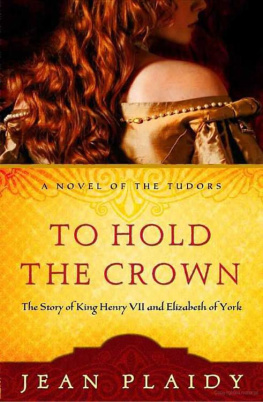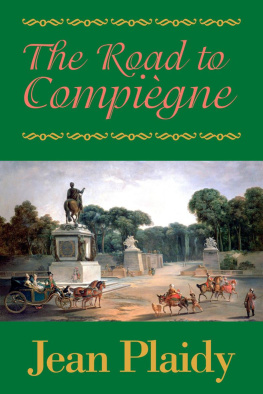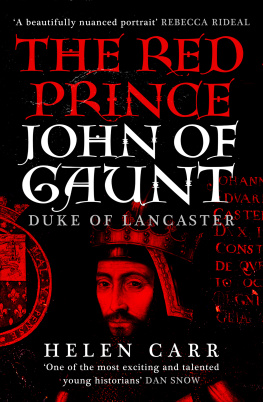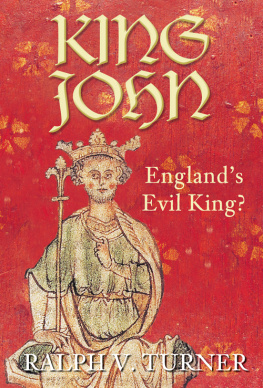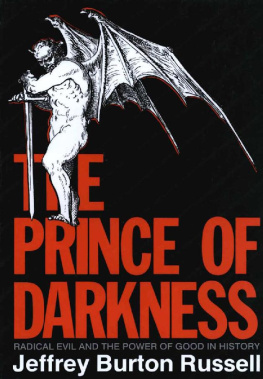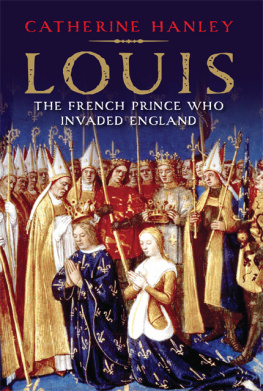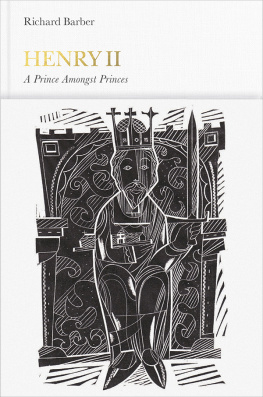Jean Plaidy
The Prince of Darkness

In a quiet room in the Chteau of Vaudreuil William Marshal, the most respected of all the Kings knights, sat dozing pleasantly after an excellent dinner of roast venison. Half sleeping, half waking he was considering what a happy state of affairs existed now that the King had returned from the Holy Land and was bringing law and order back to his dominions. Already England was at peace and Richard had restored much of that land which Philip Augustus, King of France stealing an advantage because Richard was far away had taken from him in Normandy.
William Marshal, known in the days of his youth as the finest knight of the age, renowned for his integrity and as a man who was not afraid to offend the King even though it could mean risking his life and therefore cherished by wise kings such as Richard and his father before him was now in his mid-fifties but still strong and with the weight of experience to lean on, appeared to have gained rather than lost from the passing of the years.
He had deplored the Kings absence from the country, for, while he accepted the fact that Richard had made a vow to bring Jerusalem back to Christendom, he had believed that a kings first duty was to his own kingdom; he had been against the excessive taxation which had had to be imposed in order to raise money for the crusade, but he had been indefatigable in getting together the funds required for the Kings ransom when it had been discovered that Richard was in his enemys hands in the castle of Drenstein.
Now, his brother Johns attempt to take the crown from him during his absence had been foiled and Richard was restored to his people. As William saw it, the prospects were fair or as fair as they ever could be, considering the vulnerability of the dukedom of Normandy situated as it was on the very borders of French territory.
His wife Isabella came into the room and looked at him with affection. She was a good wife and he had married her when Richard had come to the throne. She had brought him not only fine sons but riches, for her father had been Richard de Clare, Earl of Pembroke and Striguel and, although the King had not yet confirmed William in the full peace and name of earl, the earldom was in his possession, and that ceremony would be performed in due course. Before his marriage he had been known as the landless knight and had had little to recommend him but his noble birth and unrivalled skills. Henry II had recognised these and put him in charge of his eldest son Prince Henry (after he had been misguided enough to crown him so that the boy had had the title of King while his father still lived one of the gravest mistakes that usually wise monarch had ever made, for the boy, as was to be expected, became arrogant, immediately flaunting his title and flouting his father, finally making war against him and, with his brothers, bringing him in sorrow to the grave).
Smiling at Isabella William said: I was back in the past, thinking of the time when Richard came to the throne.
She looked at him gravely. You thought then, William, that your hopes of rising in the world were ended for ever.
He nodded. And that death and imprisonment would be my lot.
He lapsed into silence, thinking of that time when Richard was his enemy because he was making war on his father Henry II, whose staunch henchman he, William, was at that time, and how he had come face to face with a defenceless Richard and could have killed him. He had had no wish to do that, but he had satisfied himself by calling him traitor and killing his horse from under him. And soon afterwards Henry had died and Richard was the King.
He mused: I shall never forget it, Isabella.
I know. You have told me many times how you waited for him to order you to a dungeon and how instead he told you that he could trust one who had served his father well to serve him.
I was determined he should never regret that decision, said William.
Nor has he. He could never have had a more faithful knight and full well he knows it.
He has been good to us, Isabella. He is generous to his friends. Open, honest, forthright a man after my own heart. I knew he meant our family well when he commanded me to carry the gold sceptre at his coronation and my brother John the spurs, and how right I was!
And he allowed us to marry.
The most important benefit of all, he answered.
Well, you have served him well ever since. I wonder when we shall be hearing of the birth of an heir.
He has not long returned to Berengaria. But he knows his duty and that the dissatisfaction his subjects feel will end when he gives the country an heir. He is young and vigorous still.
But they have been married so long.
But parted.
It seems to have been a strange marriage.
It was certain to be. The King loves battle better than women.
It seems unnatural that a man cannot want sons.
He smiled at her fondly. She was proud of hers. He did not want to say that Richard preferred the company of his own sex to that of women and it was only his meeting with a hermit in a forest, when he was hunting and temporarily alone, who had so harangued him about the life he led and prophesied disaster, that had made him consider reforming his ways; and when shortly afterwards he had been laid low with a fever which threatened to end his life he had decided to return to Berengaria and do his duty by his country.
It was late, thought William. But better late than never. Richard was a man of immense strength and apart from the fever which periodically attacked him he was very healthy. If he could produce a son or two and live until they had reached maturity, that would be good for England.
I doubt not, he answered his wife, that when his son is born he will be as delighted with him as any father would be and more so, considering the importance to the realm. I trust that soon he will be sending me news that the Queen is expecting.
Poor Berengaria. Hers has not been a very happy life, I fear.
Such is the fate of queens, my dear.
She sighed. I dare swear one should be grateful that one was not born royal.
It was pleasant to have her so satisfied with her lot. She never referred to the riches and title she had brought him for she considered herself the most fortunate of women and he hoped she would long continue to do so.
As they sat talking together there was a sudden clatter of horses hoofs in the courtyard. William stood up hastily.
Who can it be? he wondered.
Isabella was at the window.
It looks like a messenger. She turned to him, her eyes shining with excitement. I wonder if it is It seems so odd. We were but talking of it a few minutes ago.
Come, said William, we will go and see.
They hurried down to the courtyard but one look at the face of the messenger was enough to tell William that the news he brought was not good.
He had dismounted and a groom had taken his horse. William cried: What news?
Ill news, my lord.
Tell me. Let me know the worst.
The King has been wounded mortally, some say.
It is not possible. In what action?
At Chaluz against Odamar of Limoges and Achard of Chaluz.
This makes no sense to me.
My lord, you were unaware that treasure was found on the land of Achard of Chaluz. News reached the King that gold figures had been discovered by a ploughman and claiming that as the suzerain this belonged by right to him he went forth to demand the treasure be given up. Achard declared that what had been found was nothing but a pot of old coins but the King did not believe him and attacked the castle. During the attack an arrow went into the Kings shoulder.


